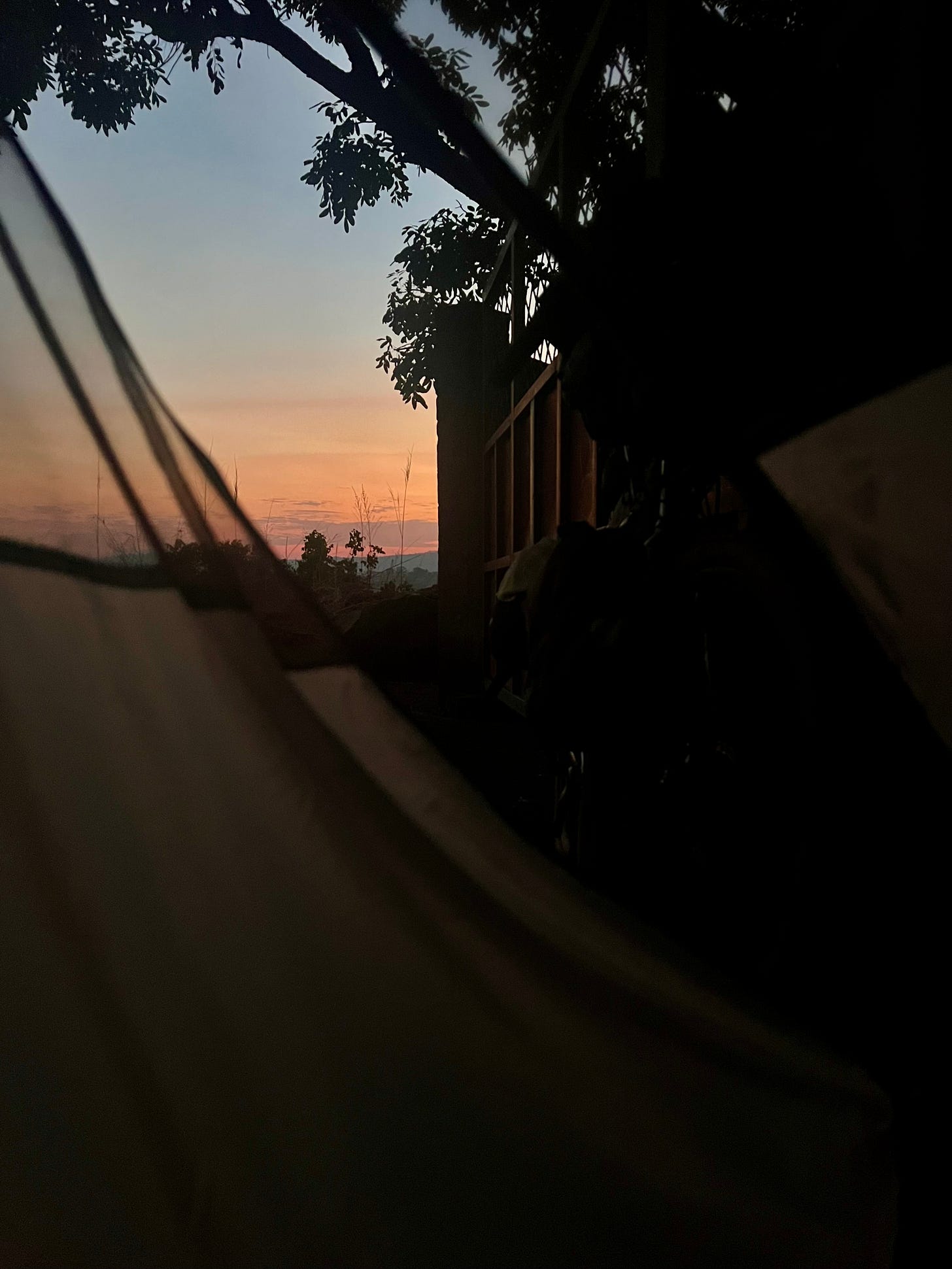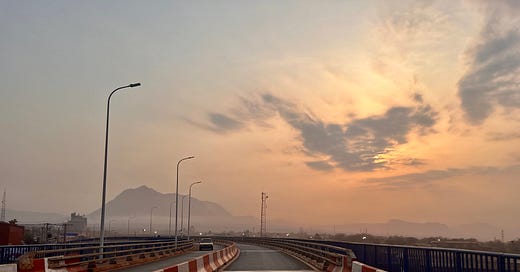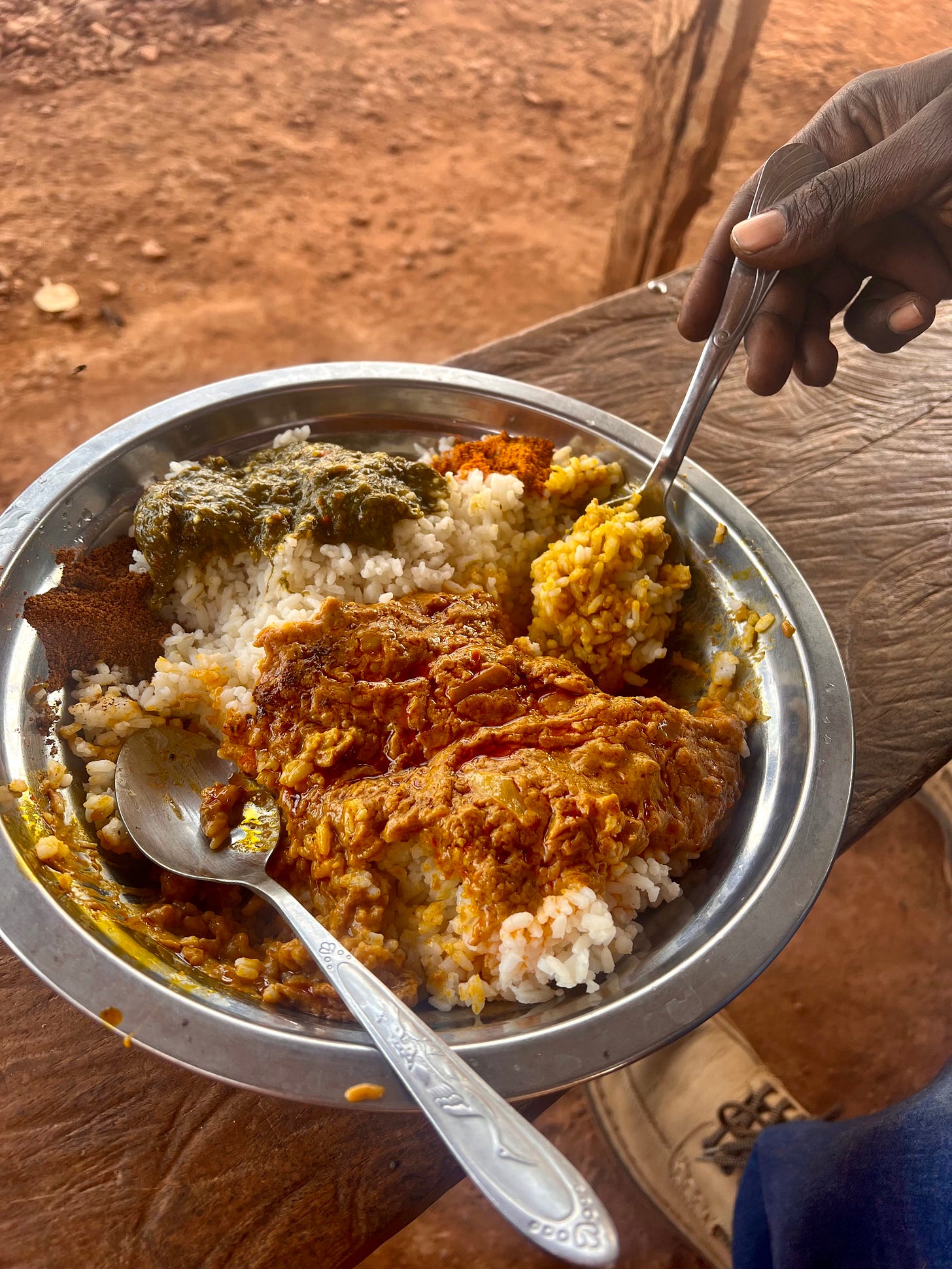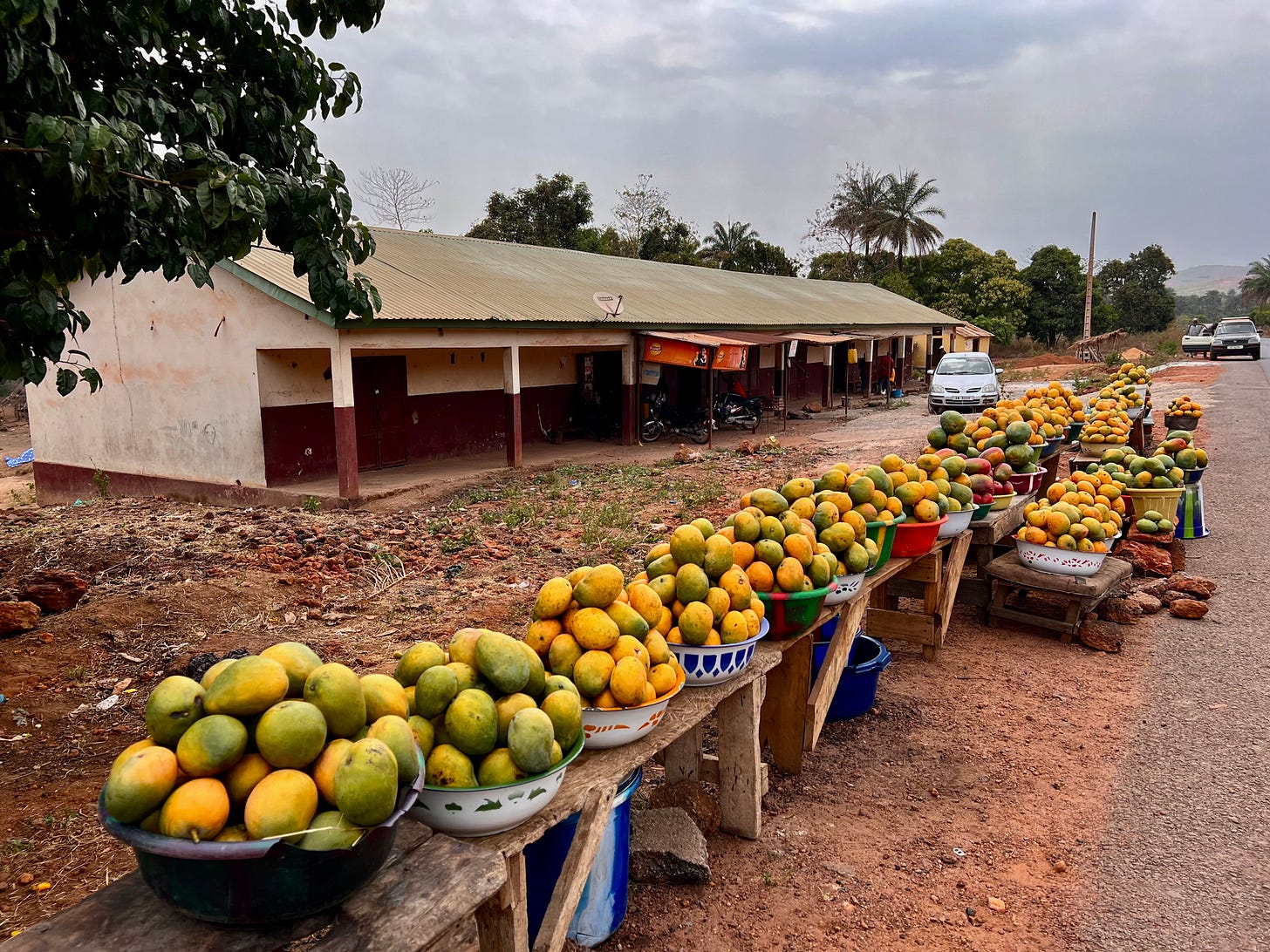Imagine you’re running a marathon. Supporters carpet every square inch of the course, all competing to shout the loudest encouragement. You, on the other hand, are not. Competing, that is. In fact, you’re the only one running. The entire crowd has shown up just to watch you. Thousands of eyes follow your every stride. And the caveat? This is not a one way street. For each and every whoop and wave, you’re expected to return the support in kind. Even when you’re redlining – hauling heavy legs up a hill at mile 20 – you have to meet every eye, acknowledge everyone, with a nod, a smile, a flick of the forefinger. Oh, and the last thing… it’s 40 degrees. If you conjure up that image, you’ll begin to understand a little about what it’s like to cycle through rural Guinea.
After four days of grit and grind slogging along the N23 – undoubtedly Guinea’s roughest road – I could have kissed the tarmac of Boké. Maneuvering Madonna one-handed over the terrain, while waving maniacally with the other, had made for acutely exhausting riding. I planned to spend that afternoon and evening resting in a cheap hotel, where I could rinse the road’s grime from every crevice and recharge any depleted devices – myself included. Usually, I track a fairly consistent five day rotation: four days on, one day off. Yet somewhere between the excitement of machete-wielding madmen and tent-hungry mega-ants, I’d clearly lost count. This was my eighth day on the road, and I’d ridden 1000km since Banjul; mostly to escape the Red Devil, of course. Safe to say, I was feeling road ragged.
I pulled into town and dived straight into the nearest coffee shack. Coffee was a crucial catalyst to the constant social output, and one I’d only just discovered. Unlike London’s coffee scene – where shops loudly announce themselves with a chalkboard A-frame and a witty caffeine-related idiom – Guinean cafés keep a lower profile. It had taken me some time to decipher the country’s high street, mostly because all roadside shops seem identical: a ramshackle combination of wooden panels and corrugated iron. As I got my eye in, however, I began to recognise the telltale signs. For cafés, this was the tall, plastic flasks lining the counter and the Moka-pot balanced precariously atop a charcoal stove outside.

Another stark contrast to the London coffee scene is the Guinean menu. Forget Cortado, Macchiato, Cappuccino and Ristretto. Like a Ford in the 1920’s, in Guinea, you can have any colour… as long as it's black. Cafénoir is pronounced as a monosyllabic bark, and its utterance triggers the arrival of something comically impractical, yet reverently ritualistic. A tiny mug, no larger than an egg cup, is filled right to the brim and brought through the bustling crowds. By the time it reaches you, half of its contents are already swilling around the saucer below. You add sugar, to taste, and use the impossibly small teaspoon to stir, displacing yet more coffee as you do. Then, you sip, give a nod of approval – to no one in particular – and pour the contents of the saucer back into your cup, not spilling a drop. Fumbling blind through the heavy haze of cigarette smoke, you locate the owner, push a crumpled 1000 Franc note into their palm (the equivalent of £0.10), and leave ready to field a fresh barrage of enthusiastic encouragement. Besides a caffeine kick, coffee shops often provide interesting company. The clientele are a boisterous bunch, and they’re invariably excited to welcome a stranger.
In Boké, as I discussed the afternoon’s R&R plans in a café with some new friends, I found myself inundated with invitations. Guinean hospitality, like that of so many of the West African nations, seems to bubble up uncontrollably. It’s a true privilege to experience. I gratefully accepted and soon Kairaba, my host, was leading me to another of the high street’s shacks: the charging station. Since the explosion of a crucial oil depot in Guinea’s capital, Conakry, in December, the country has been in the throes of an energy crisis. As a result, the government-run utility company switches off all grid power during the day. Between 8pm and 7am the power comes on again in major cities, but most of rural Guinea is currently living in a perpetual electrical blackout. Charging shops exist to keep the lights on. Their high street giveaway is the endless drone of a diesel generator, and the bank of several hundred plug sockets that blinks like a Christmas tree.
As Kairaba and I set off towards his home on the outskirts of town, he insisted we drop in on a friend of his; someone he simply referred to as Le Vieux (the old one). Le Vieux, I was told, was a philosopher, scholar and savant. He brewed natural remedies from the local flora, and took orphaned children under his wing to teach them the ways of the world. Kairaba had been one such student. As we squeezed through a crack in the heavy wooden door, I caught my first glimpse of the sage. He sat cross-legged in the middle of the room, intently inscribing a wooden tablet with intricate script. Around him lay an array of bottles, each containing liquids of various colours and textures; his remedies, as I later learnt. Completely undisturbed by our arrival, the sage continued his work without looking up. Kairaba began speaking to him in Susu – one of the seven national languages. Once Kairuba finished his story, the sage finally looked up. He fixed his eyes on me, raised an eyebrow, and let out an incredulous Ehhh?! Having no idea what Kairaba had said – and desperately hoping my reason for visiting hadn't been lost in my garbled French translation – I took a punt and nodded. Luckily, the sage tipped back his head and resonant laughter rang around the room. He continued laughing for some time, throwing in the occasional Ehhh?! for good measure, his bright eyes dancing. Afterwards, he spoke with Kairaba again before turning to me. He paused, delicately poring over each word in his mind before speaking. You are welcome.
My day with Kairaba was packed. We took white-knuckle rides on moto-taxis (motorbikes whose seats extend alarmingly at the rear to accommodate up to four passengers). We drank yet more egg-cup-coffee while watching Crystal Palace play West Ham, erupting with excitement as Palace’s Eze netted an early goal with an exquisite bicycle kick. We ate rice at the hottest local haunts, and drank palm wine at a speakeasy nestled in an old quarry. We discussed everything from the teachings of the Quran to the business models of the Chinese-run bauxite mines. By the end of the day, we were firm friends. As a member of a typically extended African family, Kairaba had cousins, nephews, aunts and brothers in all corners of Guinea. By the morning, I’d been tee’d up with a relative in Boffa, that night’s destination.
I took to the road in high spirits – feeling the heady buzz of finding new friends in unlikely places – and gladly reciprocated the endless encouragement from my roadside spectators. The mango trees that lined the road dripped with fruit and I gorged myself as I rode, wondering if I’d ever again taste anything so good. Guinea, I decided, was fast becoming the highlight of my trip. In Boffa, I was welcomed by Malik – Kairaba’s cousin – with a steaming pot of rice and some ice-cold water. We chatted late into the night and, before I retired for some well-needed rest, I was linked up with Maurice – yet another cousin who lived in Conakry.
However, as generous as these snowballing invitations were, and as grateful as I felt to be receiving them, despite being a total stranger, I sensed my social battery was beginning to deplete. On each occasion, I felt compelled to engage so wholly with my hosts, in order to properly honour their generosity, that I had no real recovery time. Holding the conversation in French – my second language, once removed – compounded this effect. I’d begun to spend all day interacting with my sideline supporters and coffee-shop companions, and all night entertaining my generous hosts with painstakingly translated stories from the road. A desire for some alone time had started to creep in.
So, contrary to the advice of Fleetwood Mac, the next day, I decided to break the chain. I contacted Maurice to thank him for the kind invitation, and politely decline – citing my need to be within spitting distance of the Ivorian embassy. This wasn’t untrue. In fact, the trip to the embassy was my only reason for a visit to the capital. It wouldn’t harm to be based on the doorstep. Conakry is located on yet another peninsula that juts out into the Atlantic, this time on Guinea’s south coast. It’s a 500km diversion from the more direct route I’d planned through the north of the country. However, with visa politics being so, well, political, the only way to secure my visa for Côte d’Ivoire – my next and final country in West Africa – was to visit the Ivorian embassy in Conakry. I decided to find a cheap room, somewhere I could lie low and replenish my social battery. Luckily, a Catholic mission was offering some such accommodation. Whilst missions aren’t typically known for their laissez faire approach, I hoped that, as a paying customer, I’d be spared the proselytism.
The morning’s ride was an anxious affair. Like any beltway connecting a country’s capital, the road to Conakry was a rat run. HGVs hurtled along, their protesting tyres squealing under crushing loads. Guinea is the world's largest producer of bauxite, and many of the mines reside between Boké and Conakry. The Chinese built roads – neo-colonial gifts given in return for the prized mining rights – have been destroyed by decades of punishment from the transport of this bounty. Great slabs of tarmac have fallen away leaving the road’s edge a fractured mess. Treacherous riding for the lowly cyclist. Craterous gaps appeared suddenly before me, forcing me to swerve into the stream of traffic. Lorries thundered past at an arm’s span. Indicate, and I’d risk losing my fingers. On top of this, there was the persistent social pressure of my roadside supporters. My patience began to wear thin. Where a few days ago I might’ve waved and flashed a broad grin, the strain of constant interaction, and the imminent threat of a pancaking, left me far less inclined to respond. After seven hours of this torture, I made it into the close maze of Conakry’s inner city, where rickshaws replaced lorries as the cyclist’s apex predator. They careered widely between the cars, squeezing through impossible gaps. Thanks to the geography of a peninsula, I knew that in a few short days I’d be forced to tackle this very same stretch again. Something needed to change.
My alarm jolted me awake at 4am on Sunday morning. Thanks to some preparation the night before, I was on the road by 4.30, pedaling through spectral streets that had, days earlier, been suicidal. Ghostly figures stumbled through the shadows, their silhouetted stilettos revealing that they were out late, rather than up early. By 6am, I’d cleared the city unscathed and settled back into the rhythm of riding. Despite the road snaking up into the mountains of the Kindia region, the heat was unrelenting. 40 degrees is tough enough in a dry climate, but with the heavy humidity that comes at the cusp of the rainy season, it’s truly oppressive. As I hauled Madonna up pass after pass, cries rained down from inquisitive onlookers. By 4pm, I was physically, socially and emotionally exhausted, and pulled over to pitch a premature camp.
Usually, I wait until dusk to set up my tent to avoid attracting any unwanted attention. This time, however, fatigue prevailed and I pitched up in the full force of the late afternoon sun. As I crawled into my tent and tried to close my eyes, I soon realised I’d built a nylon oven. I began to melt. Escaping the oppressive heat, I crawled back out, only to discover that I’d been joined by a spectator. A young boy sat not a metre from the tent, watching me intently. Preparing to re-engage my social gear, I halved a mango with him and we sat together for a moment in silence as the sun began to set. As more children passed, they were hailed over by the boy and joined our circle to sit and stare silently at the strange white man and his skeletal house. As the sun dipped below the horizon, I bade the group good night, and set my vehicle alarm – a precautionary device that emits a piercing howl if the bike moves. Trying to fall asleep was an exercise in monkish patience; it required a complete transcendence from the discomfort of my synthetic cocoon. I mopped my brow constantly as the sweat poured down, running in rivulets over my skin and pooling on my Thermarest. Things were made all the more difficult with the knowledge that I had an audience; despite dusk’s gloom, I could still make out several sets of eyes peering at me through the mesh of my tent. Thankfully my weariness won out and before long I drifted into a deep sleep.
I was awoken suddenly by the howl of Madonna’s alarm and the shrieking laughter of startled children. I poked my head out of the tent to see the gathered crowd running about, hooting with laughter and clapping wildly. I politely asked them to leave me in peace, but the kids had other ideas. This game was far too fun. After hearing the howl of my alarm for the third time, I jumped out of my tent and sent the children on their way. Wedging Madonna between me and a wall, I went back to counting sheep, praying that the peace would persist. It did not. In the early hours, I was awoken by a bright light boring through the fabric above my head. I sat up, dazed, to find the original young boy sitting cross-legged at the tip of my tent, shining a torch in my face. Clearly I was a fascinating enough specimen that he wasn’t going to let night rob him of some good old examining. Over the next half hour, I pleaded with him to turn off the light and go back to bed. Every five minutes, I’d repeat slowly and firmly, in the most basic French I could manage, that I was tired… that I needed to sleep. The language barrier held firm. I wished, more than anything else, for an invisibility cloak; something, anything, to shield me from the incessant attention. Eventually, I lost my rag and leapt out of the tent, shouting and gesticulating wildly. This, at least, was translated, and the boy scampered off into the night.

The next morning I woke to find my companion once again inches from my head. I packed up as calmly as I could, trying my best to empathise with his curiosity, frustrated with myself for losing my temper during the night. I had chosen to enter his world, to enter the world of everyone I passed along the way. I couldn’t be frustrated that this brought with it some attention. Yet, as hard as I tried, as the days of rural riding wore on, I felt ever more depleted. In each village, I was showered with cries of Toubabou! Toubabou! (White man!). Hoards of children poured out onto the road and grasped at Madonna. And every time I stopped, a crowd soon formed, with older children posing for photos, and younger ones clamouring to touch the strange skin of my arm. I began to dread riding through civilisation. Blocking out the world with my headphones, I kept my eyes fixed on the road ahead. What had happened to my enthusiasm? My desire to meet, interact, connect and learn? Not long ago, this same landscape was the highlight of my trip. I felt trapped in a loop of self-castigation and apathetic inaction. Then, when I was at my lowest, illness reared its ugly head…









No wonder your body said STOP!
The video from the red road and dodging the lorries is scary to watch let alone navigate on Madonna
Exhausting being in extrovert mode all the time and when you're also sleep depirived too, even more difficult
Take care Rosie and lookafter yourself - remember to build in those rest days! xxxx
Oh . To have a disturbed sleep . The worst torture imaginable. I feel some part of your pain . If only they could see us all as different versions of the same and not a spectacle though .
I love reading these , thank you for making me smile x